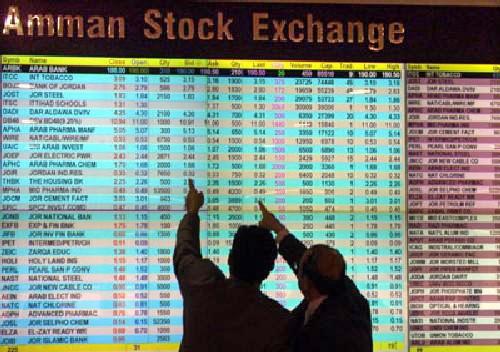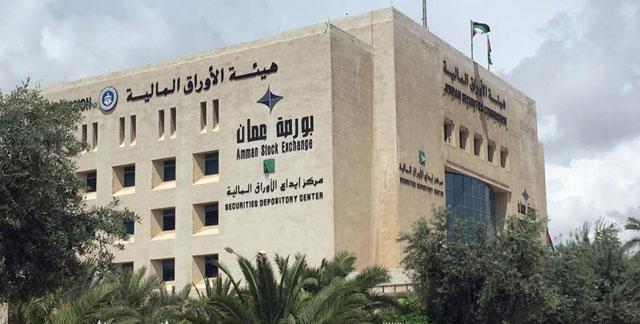You are here
‘Taxing stock profits will ward off already small investments in Kingdom’s market’
By Mohammad Ghazal - Dec 04,2018 - Last updated at Dec 04,2018

Market capitalisation of subscribed shares in the Amman bourse fell from around JD29 billion in 2007 to around JD16.2 billion in 2016, according to experts, who said imposing taxes on stock profits would only worsen the situation (JT file photo)
AMMAN — A sharp sell-off in the Amman Stock Exchange (ASE) over the past few days is due to a decision to tax stock profits ensuing from trading, experts and brokers said on Monday.
Market capitalisation of subscribed shares in the Amman bourse fell from around JD29 billion in 2007 to around JD16.2 billion in 2016, according to the experts who said that imposing taxes on stock profits would only worsen the situation.
“Imposing taxes on trading profits is a ridiculous and unstudied move that has already made scores of clients sell all their shares in spite of accumulating losses over the years,” Jawad Al Kharouf, general manager and director at Al Amal Financial Investments Company, told The Jordan Times.
“The trading volume in the bourse is too small, and taxing the profits would make investing in the bourse not encouraging at all,” he added.
Monday’s trading value amounted to JD4.4 million, spread over 4.9 million shares and traded through 2,239 transactions.
The share price index closed at 1,868 points, a slight increase of 0.39 per cent. Out of 166 companies whose shares were traded, prices of 54 entities rose and those of 27 firms declined.
According to the 2018 income tax draft bill, profits of speculation will be taxed. The Income and Sales Tax Department has yet to release details about how the tax will be calculated.
“To start with, there are no profits to be taxed,” Motaz Shami, a broker, told The Jordan Times. “The overwhelming majority of traders in the Amman bourse have incurred hefty losses since the global crisis in 2008. This is an illogical decision,” he added.
“Prices of many shares are currently way under their book value and are very tempting to buy, but traders are confused and afraid to buy,” Shami said, noting that “imposing taxes makes no sense as trading in the market is too limited”.
Mohammad Ali, an investor in the bourse, says he lost more than JD10,000 since 2008 to date, and he trades in the bourse to try to make up for his losses over the past years. “It seems difficult, but I have not lost hope,” he said.
“Now that the government wants to tax the profits, I think my hope is gone with the wind, as investors are selling and there are legitimate concerns among buyers,” he said on Monday.
The total value of shares bought by non-Jordanian investors at the ASE, since the beginning of the year until the end of November, amounted to JD736.1 million, representing 42.6 per cent of the overall trading value. The value of shares sold by them during the same period amounted to JD712.5 million.
As a result, the net of non-Jordanian investments showed an increase of JD23.6 million, compared to a decrease of JD331.4 million for the same period of 2017, according to a statement posted on the ASE website.
Arab investors’ purchases, since the beginning of the year until the end of November stood at JD199.6 million, or 27.1 per cent of the overall purchases by non-Jordanians, while the value of non-Arab purchases amounted to JD536.5 million, constituting 72.9 per cent of the total purchases.
Arab investors’ sales amounted to JD160.2 million, 22.5 per cent of non-Jordanians’ total sales, while the value of non-Arab sales amounted to JD552.3 million, representing 77.5 per cent of the total sales by non-Jordanians.
Non-Jordanian investors’ ownership in companies listed at the ASE by the end of November 2018 stood at 49.1 per cent of the total market value, with Arab investors accounting for 37.4 per cent and non-Arab investors holding 11.7 per cent of the total stakes.
Non-Jordanian ownership also stood at 55 per cent for the financial sector; 18 per cent in the services sector, and 53.8 per cent in the industrial sector.
Related Articles
AMMAN — The total value of shares that were bought by non-Jordanian investors at the Amman Stock Exchange (ASE) since the beginning of the y
AMMAN — The value of shares bought by non-Jordanian investors at the Amman Stock Exchange (ASE) since the beginning of the year until the en
AMMAN — The total value of shares bought by non-Jordanian investors in January was JD26.3 million, representing 29 per cent of the overall t

















